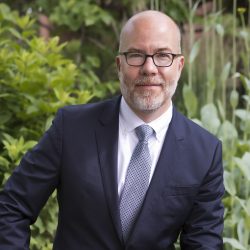Q+A with Clark Duncan on Economic Development

In 1989, Clark Duncan moved to North Carolina to attend Wake Forest University, and fell in love with both the state and his wife Sumner, a Reynolds High School graduate. He began his career working in the international development field for the United States Agency of International Development and the World Bank. From there, his career evolved into human resources, consulting, and business–which was his entree to economic development. Clark served as the Chamber’s VP of Economic Development for 10 years until his promotion to Senior Vice President of Economic Development at the Chamber and Executive Director of the EDC.
As Clark enters this new role, we want to give our community the chance to understand more about the role economic development plays in our lives, and what Clark brings to the table.
Why does a community need strong economic development leadership?
I think it’s especially important for mid-sized cities like Asheville to grow with intention. To grow with strategy. Locally, there’s great consensus that we want a stronger and more diversified economy, because that means greater opportunity for residents and children.
Largely through economic development initiatives, we’ve been able to attract great companies like New Belgium. How do you think Asheville is able to attract these high calibre companies?
When done well, economic development and community development are really intertwined. Economic development can advance more than just the jobs of a certain project or employer, creating larger ripple effects in the community.
In the case of larger projects, like recruiting New Belgium, that was a year-long conversation and a project that was very competitive among much larger cities. When New Belgium decided to come here, we learned that our community values played a helpful hand in attracting these employers, since we share a similar vision. New Belgium wanted to attract a walkable and bikeable workforce and enhance the city’s decade-long vision for riverfront development.
Would you describe this as a unique approach?
Yes, and I would say it’s reflective of the business community in Western North Carolina. It’s about more than the bottom line. We’re about healthy business because of how it empowers those in our community. We are a cross-section of Asheville that reflects its unique personality, values, and people. We encourage businesses that will lift up our entire community.
What’s our next shift as a community?
We’re in one of those pivots now as a community, looking at 2020 just on our horizon. This a great time for changing leadership on our team as we’re starting to think strategically about where we’d like to be in 2025.
Asheville has long been a place that people want to visit and want to live. We have to recognize in economic development, that means we have to have economic opportunity for people to fulfill their creative and professional passions. I think that as we become the urban center for WNC, we should think about our new identity and the responsibilities that come with it.
Economic development is key to every conversation we’re having in our community now, around affordability, around wage stagnation, around equity. If we’re strategic and intentional about how we perform the disciplines of economic development, we’re bringing solutions to those problems in our community.
Are there any initiatives you are especially focused on?
Strengthening area workforce and developing our next generation. April Brown from the Chamber is leading that charge, and she’s doing two really smart things in her first year. One is leading a ten-county survey of employers, which represents our total labor shed. The survey results will inspire data-driven initiatives to attract more talented workers to our area.
The second really smart use of time and partnership is a collaboration with UNCA and WCU, which is building stronger bridges for existing college students into career opportunities here in Asheville. We’re charged with retaining our best and brightest, whether that’s an 18 year-old high school student or a 22 year-old college graduate. We need their talents and passions here and contributing to the future of Asheville.
For that same reason, we have also participated in the CAYLA program for the last ten years. We see our relationship with CAYLA as making that investment in our next generation.
Anything else you’d like to share as you transition into this new role?
The future is incredibly bright. Some of our challenges are also our greatest opportunities. We’re growing at a pretty consistent 1-2% each year. We continue to attract bright, talented, and educated people. With population growth, comes newer and better economic opportunities. I see growth opportunities in professional office jobs. I see a great upside in our tech community continuing to grow and flourish. I think we’ve carved out a really smart niche in a very forward looking advanced manufacturing community, an industry that’s high-wage and knowledge-based.